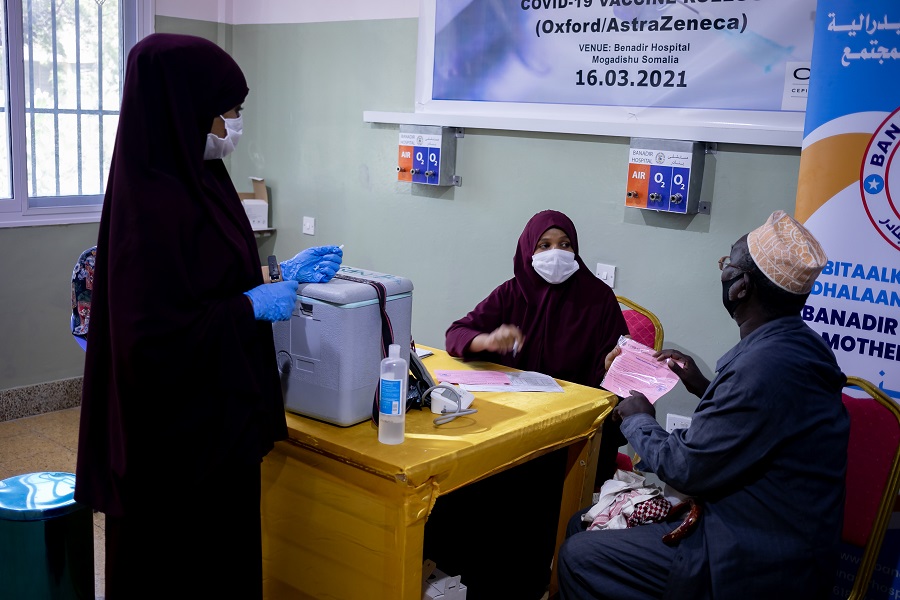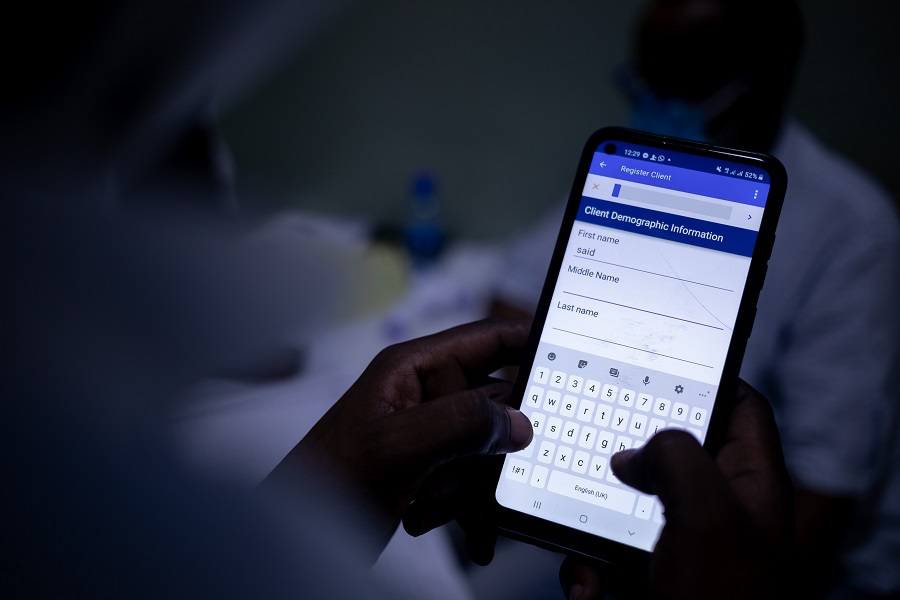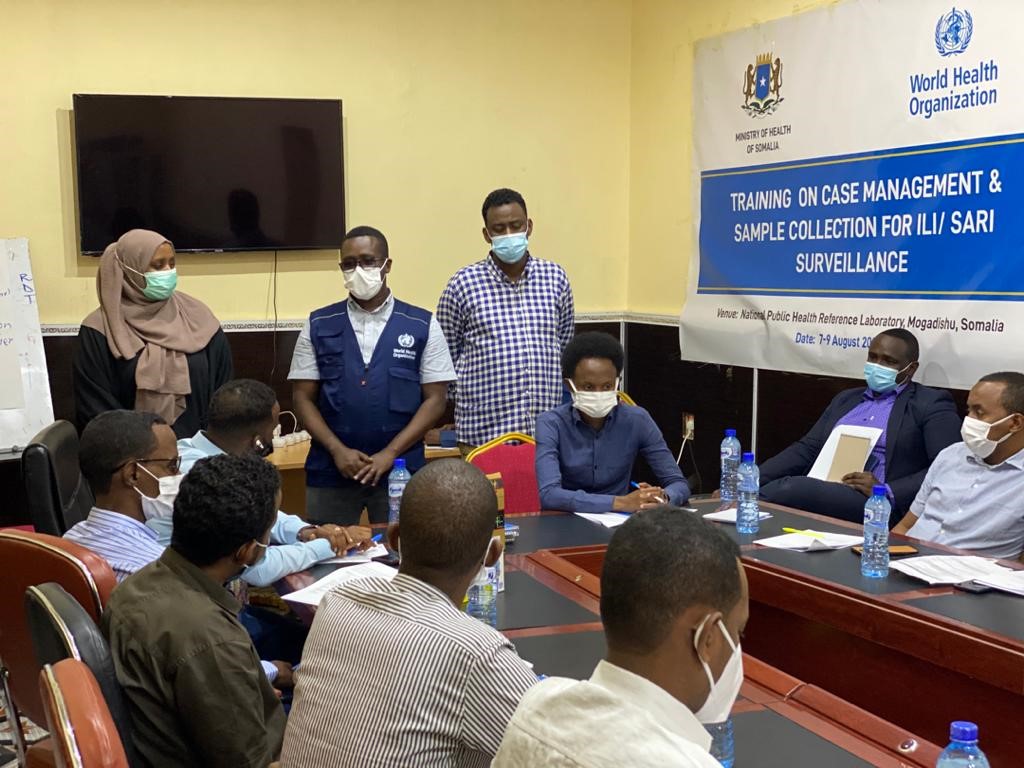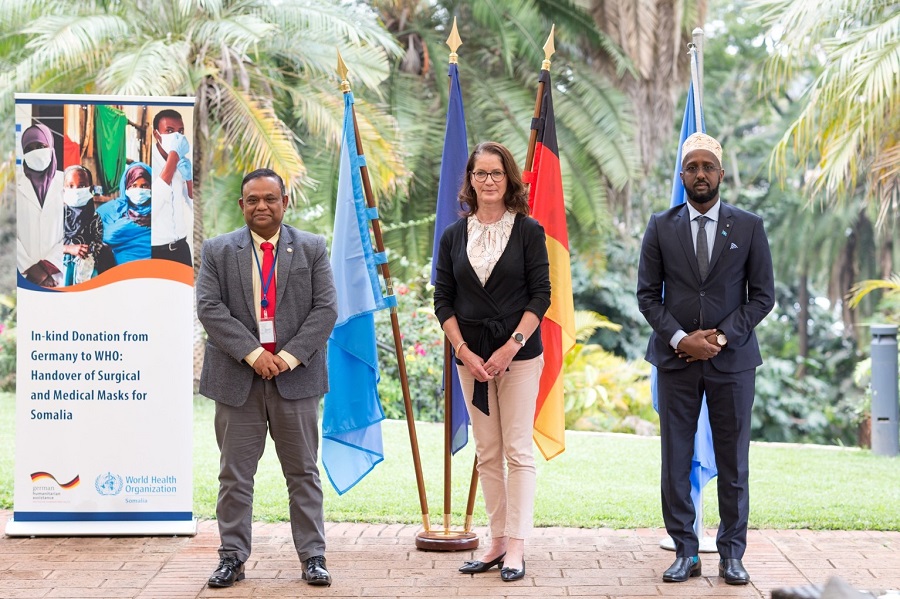World Patient Safety Day: Somalia, UN urge all stakeholders to redouble efforts to keep mothers and newborns safe in midst of COVID-19 pandemic
Mogadishu, 17 September 2021 – While commemorating World Patient Safety Day yesterday, the Federal Government of Somalia, in collaboration with the World Health Organization (WHO), United Nations Children’s Fund (UNICEF) and United Nations Population Fund (UNFPA), urged health facilities, health care workers and other stakeholders to step up efforts to ensure mothers and newborns remain safe.
This message echoes this year’s theme for World Patient Safety Day — ‘Safe maternal and newborn care’ — and comes at a time when the coronavirus disease-2019 (COVID-19) has disrupted continuity of already overstretched essential health services across the country.
A national ‘pulse survey’ conducted by WHO over seven months in 2020 and 2021 to determine the continuity of essential services in Somalia found that, during May–September 2020, 33% of essential health services had been disrupted (one out of three services), while during January–March 2021, there was continued disruption of 12% of essential health services (six out of 51 services), indicating that substantial disruptions persisted even after one year of the pandemic. Six of the major essential health services where significant disruptions were noted include reproductive, maternal, newborn, child and adolescent health services, that experienced between 5 and 50% disruption, and immunization services, disrupted by between 5 and 20%.
Even before the COVID-19 outbreak was confirmed in Somalia, the country was known to have one of the highest maternal mortality rates in the world, at 692 maternal deaths per 100 000, and a neonatal mortality rate of 40 deaths per 1000 live births.
“Before the COVID-19 pandemic, 68% of women did not visit health facilities for antenatal care and only one third of births were delivered with the help of a qualified health care practitioner,” said Dr Fawziya Abikar Nur, Minister of Health and Human Services for Somalia. “Since the COVID-19 pandemic was confirmed in Somalia, women have been making even fewer visits to seek help. I would like to encourage all our partners to reconsider their strategies to ensure more pregnant women access health facilities for antenatal care, deliveries, and immunization, to offer young children a safe start to their lives.”
As part of this year’s World Patient Safety Day commemorations, all partners, including WHO, are urging all stakeholders to “Act now for safe and respectful childbirth.” Ensuring appropriate and respectful treatment to delivering women and their babies will increase trust in health facilities, utilization of services and support by the communities.
“At the points of care, we need to continue to develop the capacity of health care workers, while maintaining the highest standards of hygiene and safety to prevent any potential spread of diseases and to ensure patients recover,” said Dr Mamunur Malik, WHO Representative to Somalia. “At the same time, we need to encourage family members, including men, to bring pregnant mothers to their nearest health centres for regular antenatal care and delivery, to prevent women and children from dying of preventable causes and unsafe care. With concerted efforts, we can save more lives, but we all need to act now to make a change.”
“Having a skilled pair of hands – a well-trained doctor, nurse or midwife – present during pregnancy, birth and beyond, is key in giving every Somali child a chance to survive and thrive from the very beginning,” said UNICEF Somalia Representative, Mohamed Ayoya. “UNICEF is proud to partner with the Government of Somalia to enhance its efforts to reach vulnerable women and children, living in the most disadvantaged areas and enduring the harshest conditions, who need the support most, amid the COVID-19 pandemic.”
“Every mother has a right to a safe delivery through skilled birth attendance at birth. This is a service that can be scaled up to reach the underserved and underprivileged population across the country. This can be achieved through the ongoing engagement of the public sector and the services provided by the non-government sector,” said UNFPA Representative, Mr Anders Thomsen.
Mr Thomsen said skilled birth attendance is an evidence-based public health intervention to reduce maternal and neonatal mortality and morbidity. “UNFPA continues to invest in this effort in close partnership with the Ministry of Health, by supporting health facilities providing life-saving skilled birth attendance at birth as well as ensuring the production of qualified midwives who provide the best option in Somalia for truly reaching the most underserved population in the country with safe and life-saving care,” said M Thomsen.
Introduced in 2019, World Patient Safety Day aims to promote understanding of patient safety, increase public engagement in health care safety, and promote global action to prevent and reduce avoidable harm in health care. This year, on the World Patient Safety Day, WHO, UNICEF and UNFPA committed to support the Federal Ministry of Health and Human Services to introduce new interventions and measures across the health facilities in the country, which will ensure safer maternal and newborn care every year.
Related link
For more information, please contact:
Khadar Hussein Mohamud
Head of Coordination and Communication
Federal Ministry of Health
Fouzia Bano
WHO Chief of Staff ai, Communications Officer
+252 619 235 880
Eva Hinds
UNICEF Communication Manager
+252 613 642 635
Pilirani Semu-Banda
UNFPA Communications and Partnerships Specialist
+254 734 500 439
Editor’s notes
World Patient Safety Day was established in 2019 by the 72nd World Health Assembly through the adoption of resolution WHA72.6 – “Global action on patient safety”. The Day is firmly grounded in the fundamental principle of medicine – first do no harm.
The findings of the second round of the national pulse survey conducted by WHO on the continuity of essential health services during the COVID-19 pandemic for Somalia are available at the interactive dashboard.
Protecting Somalis from COVID-19 while creating a fairer, more equitable world
 A health care worker briefs an elderly gentleman after he receives his COVID-19 vaccines, Banadir Hospital, March 2021. Photo: WHO
A health care worker briefs an elderly gentleman after he receives his COVID-19 vaccines, Banadir Hospital, March 2021. Photo: WHO
15 September 2021 – Since the day the news of availability of safe and effective COVID-19 vaccines emerged, the Federal Government of Somalia has worked hand in hand with the World Health Organization (WHO) and other key partners to secure vaccines for Somalis.
One year after the first case of COVID-19 was confirmed in Somalia on 15 March 2021, the first consignment of 300 000 AstraZeneca vaccines for COVID-19, received through the COVAX Facility, arrived in Mogadishu. In the following months, frontline workers, including health care workers; the elderly people; and people with chronic health conditions were targeted for vaccination as the first priority groups to receive COVID-19 vaccines.
An insight from a nurse trained to offer vaccinations
As a nurse and being a frontline health worker, 26-year-old Ikram Ahmed Mohamed was among the first to be fully vaccinated against COVID-19.
“I work 6 days a week at the Banadir Hospital – and feel like this is the busiest COVID-19 vaccination site in the country,” says Ikram. “In the beginning, most of the people were elderly, but nowadays, more young people aged between 20 and 40 years are coming to get vaccinated. For some reason though, we have been seeing more men than women taking the vaccines.”
Health care workers like Ikram are trying their very best to dispel rumours and fears. He explains, “Sometimes I do meet people who do not want to get vaccinated. But it is my job to convince them to trust the vaccine. I explain to them the benefits of vaccination and tell them I took it too.”
“Initially, I was a nurse, but before the first COVID-19 vaccines came to Somalia, the Government and WHO trained health professionals like me to administer COVID-19 vaccines safely,” adds Ikram. “Today, I am happy and proud to be a vaccinator, as I feel I am working to combat deadly diseases like COVID-19. I really feel like I am contributing to my community.”
Intensifying the race against time to keep people safe
 Every day trained health care workers, enter key personal and demographic data on every COVID-19 vaccinees into an online database. This helps the Government to track the vaccine recipient for the second dose and monitor any adverse events following vaccination. Photo: WHO
Every day trained health care workers, enter key personal and demographic data on every COVID-19 vaccinees into an online database. This helps the Government to track the vaccine recipient for the second dose and monitor any adverse events following vaccination. Photo: WHO
Along with many other countries around the world, Somalia too is in a race against time to boost the uptake of COVID-19 vaccines and keep communities safe. As the pattern of COVID-19 cases continued to surge and plummet, on 8 August 2021, another shipment of 108 000 doses of AstraZeneca vaccines, donated by the Government of France through the COVAX Facility, landed in Somalia. A week later, the United States of America donated a consignment of 302 400 doses of Johnson & Johnson single-shot vaccines, also supplied through the COVAX Facility.
To protect more Somalis, and boost vaccine uptake, the Ministry of Health and Human Services, in collaboration with WHO, and the United Nations Children’s Fund (UNICEF) and other partners, have introduced various strategies. For instance, they deployed special outreach teams of vaccinators to visit different areas in Banadir during the last round of campaign. The same strategy was used in Somaliland. In addition to searching for people with COVID-19 to offer them the right support, community health workers have been trained to explain the benefits of vaccination and COVID-19 preventive measures.
So far, Somalia has 18 019 confirmed cases of COVID-19 and 982 deaths. As of 12 September 2021, of the 408 000 doses of AstraZeneca, 200 000 doses of Sinopharm and 302 400 doses of Johnson & Johnson doses received by Somalia either through COVAX directly or through donation via the COVAX, 342 063 doses (83%) have been administered, with 116 267 Somalis having been fully vaccinated (0.77%).
Together, the Ministry of Health and Human Services, State ministries, WHO, UNICEF and other partners are regularly meeting to monitor vaccine uptake, manage the distribution of and monitor life-saving supplies, and strengthen strategies to interrupt transmission of the disease.
Acknowledging the crucial role of donors
The response to the COVID-19 outbreak in Somalia has been made possible with the generous support of donors and partners, particularly the European Union (EU) Delegation to Somalia which has provided funding to cover the operational costs for the rollout of COVID-19 vaccinations all across the country. This support has enabled the country to roll out the vaccination against COVID-19 effectively to end the pandemic and help in recovery of the health systems towards building a fairer and healthier world.
Somalia makes progress in establishing seasonal influenza surveillance to protect vulnerable communities from future pandemics
 15 September 2021 – Somalia is one of the few countries in WHO Eastern Mediterranean Region without a functioning surveillance system for seasonal influenza. The electronic-based Early Warning Alert and Response Network (EWARN) surveillance system used in Somalia enables health workers, as well as state and national surveillance teams, to conduct real-time surveillance and promptly respond to epidemic-prone diseases. However, the system provided limited information required for epidemiological surveillance and the country lacked the capacity to conduct virological surveillance for seasonal influenza and other common respiratory viruses.
15 September 2021 – Somalia is one of the few countries in WHO Eastern Mediterranean Region without a functioning surveillance system for seasonal influenza. The electronic-based Early Warning Alert and Response Network (EWARN) surveillance system used in Somalia enables health workers, as well as state and national surveillance teams, to conduct real-time surveillance and promptly respond to epidemic-prone diseases. However, the system provided limited information required for epidemiological surveillance and the country lacked the capacity to conduct virological surveillance for seasonal influenza and other common respiratory viruses.
In April 2019, the WHO RegionalOffice for the Eastern Mediterranean conducted a technical mission to Somalia and assessed the suitability of 3 sentinel sites for conducting surveillance for severe acute respiratory infection (SARI). The mission also visited a number of primary health care centres to assess the feasibility of conducting surveillance for influenza-like illness (ILI). Some of the major gaps identified included the limited capacity of health workers to conduct influenza surveillance and the lack of capacity of the laboratories to conduct molecular tests for influenza viruses.
During the COVID-19 pandemic, WHO helped the Government of Somalia establish 3 molecular laboratories with biosafety level 2, which are capable of testing COVID-19 using
rt-PCR assay. Currently, under the European Union-funded project titled “Emergency operational response to COVID 19 in Somalia to support the prevention of large-scale community spread through public health systems strengthening”, building on WHO’s investment in enhancing country’s capacity for detection of COVID-19, WHO is now supporting the Federal Government of Somalia and Federal Member States and expand the existing system of epidemiological and virological surveillance for COVID-19 to include sentinel-based surveillance system for severe acute respiratory infection and influenza-like-illness. In order to build the system for surveillance of seasonal influenza, leveraging on current system for COVID-19, WHO organized a series of trainings, whereby 60 frontline health workers (20 females and 40 males) from the 3 selected sentinel sites were trained on conducting epidemiological surveillance for seasonal influenza and reporting; four virologists from the public health laboratories of Somaliland and the National Public Health Reference Laboratory in Mogadishu were trained on the detection and diagnosis of seasonal influenza using molecular test. In addition, 5 data managers were trained to collect and report ILI/SARI epidemiological information. WHO also equipped the 3 public health laboratories across the country in Mogadishu, Hargeisa and Garowe with necessary equipment and provided laboratory supplies for molecular detection of seasonal influenza.
“Working alongside the Federal Government of Somalia, we have taken bold steps to ensure Somalia makes progress for the detection and diagnosis of seasonal influenza and contributes to the WHO’s network of Global Influenza Surveillance and Response System (GISRS) whose main function is to monitor the circulation of novel influenza viruses as well as seasonal and zoonotic influenza viruses with epidemic and pandemic potentials,” said Dr Mamunur Rahman Malik, WHO Representative to Somalia and Head of Mission. “The support of the European Union (EU) Delegation to Somalia in establishing this surveillance system for seasonal influenza as part of our ongoing COVID-19 response will build back better and prepare the country’s readiness to face future pandemic from influenza and other respiratory viruses.”
In the coming months, and with support from the EU, the WHO country office for Somalia plans to continue to support the Government to establish this sentinel-based surveillance system for seasonal influenza during the coming months of winter. WHO will also continue to support in the areas of epidemiological and virological surveillance for influenza and other epidemic- and pandemic-prone respiratory viruses and ensure the sharing of viral isolates with WHO collaborating centres across the world for vaccine strain selection.
The WHO country office for Somalia will continue to work with the Gvernment of Somalia to strengthen the health system in the country and provide essential health and nutrition services to the most vulnerable populations across the country with funding support from the EU Delegation to Somalia.
Note to editors
This important multi-year partnership stems from a Bilateral Technical Coordination Mechanism previously established between WHO Somalia and the EU Delegation to Somalia, which sought to strengthen joint operational response capacities for COVID-19 and other health emergencies. In addition to providing in-kind flight support to transport vital medical equipment, supplies and COVID-19 samples for testing during the flight lockdowns, the EU also provided WHO with US $5.8 million to support COVID-19 response and health systems strengthening initiatives, while an additional US$ 1.9 million was provided by the European Civil Protection and Humanitarian Aid Operations (ECHO) to WHO in January 2020, in support of WHO’s COVID-19 emergency preparedness and response operations in Somalia.
Related links
EU and WHO Somalia sign multi-year agreement to combat COVID-19 and strengthen health systems
WHO and EU unite to fight COVID-19 in Somalia
EU and WHO unite to deliver critical life-saving supplies to flood-affected areas in Somalia
European Union and WHO Somalia deliver more emergency hospital supplies
EU and WHO deliver emergency life-saving supplies to flood-affected areas in Somalia
For further information, please contact:
Mr Kyle DeFreitas
External Relations Officer
Ms Fouzia Ban
Communications Officer WHO Somalia
Mr Vicente Sellés
Programme Manager/Liaison Officer/ Delegation of the European Union to the Federal Republic of Somalia
Mr Hassan Santur
Strategic Communications Specialist; Delegation of the European Union to the Federal Republic of Somalia
Germany donates 1.3 million face masks to WHO for its COVID-19 response work in Somalia: more face masks means more people protected

Mogadishu, 31 August 2021 – The Ministry of Health of the Federal Republic of Germany has made in-kind donations of surgical and medical masks to the World Health Organization (WHO) over the past months. As part of this donation, the WHO country office in Somalia, received today 1 386 000 surgical and medical face masks for its work in Somalia as part of its coronavirus disease (COVID-19) response. H.E. Annett Günther, the German Ambassador to Somalia, handed over the masks to Dr Mamunur Rahman Malik, the WHO Representative to Somalia, in the presence of Mr Omar Hussein Ali, Chargé d’Affaires at the Somali Embassy to Kenya, during a small event held on 31 August at the Ambassador’s residence.
This support comes at a time when Somalia is facing a new wave of COVID-19 infections. Since the outbreak began on March 2020, Somalia has reported 16 831 laboratory-confirmed cases of COVID-19, including 913 deaths, as of 21 August 2021.
In a statement made at the handover event, Dr Mamunur Rahman Malik stated, “The surgical face masks we have received are an immensely valuable public health resource for Somalia, as they will indeed offer a shield of protection for many frontline workers, including health workers, vulnerable populations, and other community members, not only from COVID-19 but also from other infectious respiratory diseases. As every country is facing a rise in case counts, possibly due to new variants which are spreading fast across the world, it is imperative for all Somalis to keep wearing the face masks to keep safe and protected. Wearing masks in public places, especially in mass gatherings, not only reduces the risk of transmission but may also reduce the possibility of new variants of COVID-19 emerging”.
“We would like to extend our sincere gratitude to the Government of Germany for partnering with WHO and the Government of Somalia to prevent the spread of COVID-19,” added Dr Malik. In addition to the masks, Germany has also provided support in the form of US $1 million through a global contribution in support of the WHO country office’s response to COVID-19 in Somalia.
German Ambassador Annett Günther underlines that “Germany stands with Somalia in the fight against the global pandemic. In midst of a resurgence of cases in Somalia Germany complements its financial contributions of €2.2 billion to the multilateral ACT-A initiative with in-kind support in form of 1.3 million surgical masks to Somalia. Even with vaccination programmes rolling out it is important to work together and protect each other by complying with hygiene and distance measures. We are confident that both the masks, as well as the deliveries of vaccines via the COVAX Facility in the past weeks will benefit Somalia’s population greatly and help get through this precarious time.”
The face masks will be distributed to the Federal Government and Federal Member States of Somalia as part of COVID-19 response activities, to be used by the general population, as well as frontline workers involved in managing public services amid the ongoing COVID-19 outbreak in the country.
For additional information, kindly contact:
Judith Gosmann
Policy Officer Somalia Unit
+254 758 726 179
Fouzia Bano
WHO Chief of Staff ai, Communications Officer
+252 619 235 880


